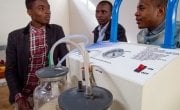
Read our 2024 annual report

Knowledge Hub
Why innovations? Finding effective solutions to some of the world’s biggest problems requires innovative thinking and a pragmatic approach. By building on our experiences, learnings and partnerships with the communities with whom we work, we hope to achieve exactly that.
Wherever we work, we are on the lookout for new ideas and ways of doing things differently. At its core, innovation is not simply doing things better. Innovation for us means creating value at scale with solutions that are more effective, more efficient and more sustainable.
It is about tackling the complex challenges faced by the world’s most vulnerable in radically new ways, but also about applying proven ideas, technologies and processes from other sectors and adapting established approaches into new contexts. This bring about transformation for the poorest.





A closer look at our innovations
We aim to contribute to lasting improvements in the lives of the extremely poor through the implementation of innovative and pragmatic programmes. Here we spotlight three of our latest innovations.
The Maker Movement
The Maker Movement for maternal, newborn and child health is a project which draws on local skills and expertise to tackle the critical shortage of working medical equipment in hospitals in Kenya. Through a partnership between the University of Nairobi and Kenyatta National Hospital, university engineers and students are teaming up with maternity ward doctors, nurses, and biomedical engineers to design high-quality, affordable medical devices better suited for local needs.
From the initial nine devices found to be most needed, the project prioritised and designed three: an examination light, a suction machine to remove fluids from a newborn’s airways and a phototherapy machine for treating newborns with jaundice. After developing and refining multiple versions of the suction machine, the Kenya Bureau of Standards approved it for testing in a clinical setting. The project also provided a calibration centre for repairing hospital devices and a brand new lab on campus stocked with equipment for designing and prototyping devices.
The Maker Movement’s success since its 2014 launch has led to a new partnership between Concern Worldwide, UNICEF, the Philips Foundation and Gearbox. This partnership is called the Maternal and Newborn Health Innovations Project.
Chipatala Cha Pa Foni (CCPF)
Community-based Management of Acute Malnutrition (CMAM) Surge
Organisations who fund us

Other ways to help
Corporate support
Is your company interested in working together for a common cause?
Fundraise for Concern
From mountain trekking to marathon running, cake sales to table quizzes, there are lots of ways you can support our work.
Buy a gift
With an extensive range of alternative gifts, we have something to suit everybody.
Leave a gift in your will
Leave the world a better place with a life-changing legacy.
Volunteer with Concern
The lots of ways to get involved with our work as a volunteer
School fundraising
Without the generous support from schools, we wouldn't be able to do the work that we do.





